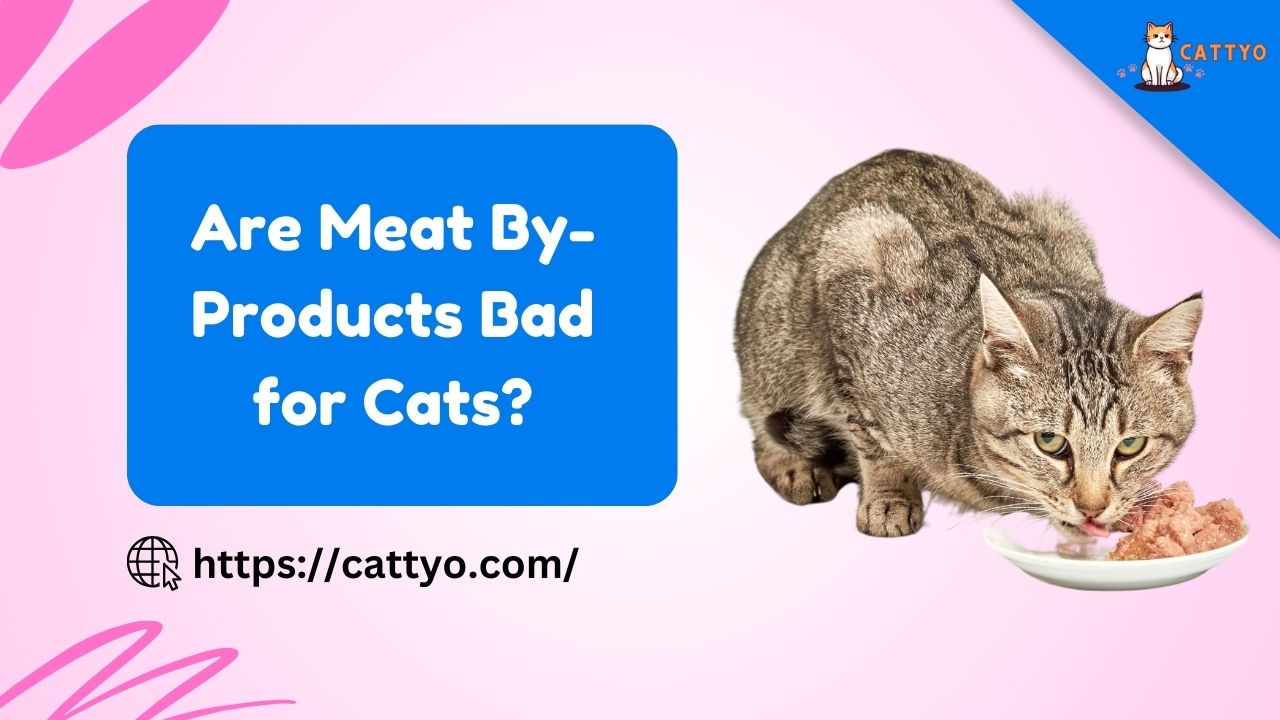No, meat by-products aren’t necessarily bad for cats. They include nutrient-rich organs like liver and kidneys, which are beneficial. However, quality matters—choose trusted brands that ensure proper sourcing and processing for your cat’s safety.
If you’re a cat owner, you’ve probably found yourself standing in front of an overflowing pet food aisle at some point, wondering: What exactly am I feeding my feline friend?
Between the cans, bags, and pouches of food, each with their own glossy labels promising “premium” or “natural,” one thing that often pops up is “meat by-products.” The question is—are these bad for your cat?
Are they something to worry about, or just another marketing buzzword?
Before you start Googling and diving down a rabbit hole of confusing pet food jargon, let’s break this down, explore the nuances, and, most importantly, make sure your kitty is eating something that’s actually good for them.
Are Meat By Products Bad for Cats?
Meat by-products can be a healthy component of cat food if sourced and processed properly. They often include nutrient-dense organs but require careful evaluation of quality.
- What Are Meat By-Products?-Non-meat parts like liver, kidneys, and lungs that are rich in nutrients.
- Are All Meat By-Products Safe?-Quality varies; trusted brands ensure safety and proper processing.
- Benefits of Meat By-Products-Provide essential vitamins, minerals, and protein for cats.
- Concerns About Low-Quality By-Products-May include fillers or poorly processed ingredients if not regulated.
- How to Choose Safe By-Products for Cats- Look for reputable brands with clear ingredient sourcing and labeling.
High-quality meat by-products can be beneficial, but always prioritize trusted sources for your cat’s health.
What Are Meat By-Products, Anyway?
Alright, let’s start with the basics. Meat by-products are the parts of an animal that don’t make it into the final cut of what we’d consider “human-grade” meat.
We’re talking about organs like the heart, liver, kidneys, and lungs, as well as other parts like bone, skin, and blood. Essentially, they’re leftover bits that are still packed with nutrients, but they don’t make the cut for human consumption.
Now, before your mind starts imagining your cat munching on a plate of cow intestines, let me clarify: these by-products are often highly nutritious and can actually be very beneficial for your cat. Cats, being obligate carnivores, need a lot of protein, and meat by-products often provide just that.
But here’s the kicker: Not all meat by-products are created equal. Some are more nutritious than others, and the quality can vary greatly depending on the brand and manufacturer.
The Great Debate: Are Meat By-Products Really That Bad?
Here’s the thing—there’s a lot of mixed information out there. Some people swear by the idea that meat by-products are unhealthy, while others argue that they’re perfectly fine, even beneficial, for cats. So which side is right?
To answer this, we need to consider a few factors.
1. Quality Matters
Not all by-products are the same, and some are far more nutritious than others. High-quality by-products like liver and heart are excellent sources of essential nutrients like taurine, iron, and vitamin A. These nutrients are critical for a cat’s heart health, vision, and overall well-being.
On the flip side, some lower-quality by-products could include less nutritious parts like feathers, beaks, and feet—stuff that your cat really doesn’t need. These parts are often fillers that don’t offer much in terms of nutritional value.
Tip: Check the ingredient list. If the by-products are listed as specific organs or tissues (like “chicken liver” or “beef heart”), you’re likely looking at a good source of nutrition. But if the label just says “meat by-products” without being specific, it might be a red flag.
2. Balance Is Key
Here’s a thought—what if we overcomplicated things? What if, in our attempt to avoid meat by-products, we missed out on the actual nutrients cats need?
Cats need a balance of muscle meat, organs, and other animal-based nutrients in their diet. If you’re only feeding them prime cuts of chicken breast, for example, they might be lacking in key vitamins and minerals that are abundant in organs.
In the wild, cats would eat the entire animal—muscle, organs, bones, and all. So, when formulated properly, meat by-products can actually help mimic this natural, balanced diet.
It’s about making sure the by-products aren’t the only thing in the food. A little variety is essential for their health.
3. The Ethical and Economic Angle
Let’s take a step back and think about this from an environmental perspective. If meat by-products were discarded, they’d simply end up as waste. By using them in pet food, we’re actually reducing food waste and getting more use out of the animals we do consume. Pretty neat, right?
Also, meat by-products are often cheaper than whole cuts of meat, which means pet food manufacturers can offer a more affordable product without sacrificing too much nutrition.
4. Marketing Hype vs. Reality
Here’s where things get tricky. Some pet food brands throw around phrases like “no by-products” or “100% pure meat” to attract concerned customers.
But here’s a secret: Just because a brand doesn’t list meat by-products on the label doesn’t necessarily mean the food is better. Often, it just means they’ve used a different, possibly less nutritious, part of the animal or even a plant-based protein.
When you’re looking at a pet food brand, it’s always best to consider the whole picture—what’s the protein source? What’s the overall nutrient balance? Is the food complete and balanced for your cat’s age and activity level? Don’t let a buzzword fool you into thinking it’s automatically better.
Is It Dangerous for Cats?
So, after all this, are meat by-products actually dangerous? The short answer is: No—when properly sourced and processed, meat by-products are not inherently dangerous for cats.
In fact, they can be a highly nutritious part of their diet. However, some low-quality by-products, such as feathers or low-grade animal parts, might not offer much nutritional value and could be harder for your cat to digest.
But here’s the thing: If you’re feeding your cat a reputable brand of food with a balanced formula that uses quality meat by-products, you’re probably doing just fine.
On the other hand, if you’re feeding them an off-brand food with vague ingredient lists and little to no information about sourcing, well… that’s a bit of a gamble.
Table Of What to Look for in Meat By-Products for Cats
When selecting cat food with meat by-products, focus on quality and transparency. Opt for trusted brands that specify the inclusion of nutritious organs like liver and kidneys.
Ensure the product avoids fillers, additives, or poorly processed ingredients.
Look for certifications or labels guaranteeing safe sourcing and processing. High-quality meat by-products can provide essential nutrients, supporting your cat’s overall health.
| Ingredient Type | Good Quality Source | Potential Red Flag |
|---|---|---|
| Organs (Heart, Liver, Kidney) | Rich in essential nutrients like taurine and vitamin A | Generally, organs are good, but ensure they’re specified as “beef liver” or “chicken heart” |
| Muscle Meat (Chicken, Beef) | Excellent protein source | – |
| Bones | High in minerals like calcium | Can be difficult to digest or cause choking if not processed correctly |
| Feathers/Feet/Beaks | Often used for low-cost fillers | Low nutritional value, not ideal for cats |
| Blood | High in protein and minerals | Generally good in moderation |
FAQs About Meat By-Products and Cat Food
Q: Can meat by-products cause allergies in cats?
A: It’s possible, but not likely. Most cats are allergic to specific proteins (like chicken or fish), not the by-products themselves. However, if your cat is having digestive issues or allergic reactions, it’s always best to consult with your vet to narrow down the cause.
Q: Should I avoid all meat by-products in my cat’s food?
A: Not necessarily. As long as the meat by-products are high-quality and sourced from trusted suppliers, they can be an important part of your cat’s balanced diet. Just be mindful of the overall ingredient quality.
Q: Are “premium” pet foods better than regular ones?
A: Not always! Premium brands can sometimes use higher-quality ingredients, but that doesn’t mean they’re always worth the extra cost. Look at the ingredients and nutrition label carefully—sometimes, it’s about what’s inside, not the fancy packaging.
Q: What are the best meat-based ingredients for cats?
A: High-quality protein sources like chicken, turkey, and beef are fantastic for cats. Organ meats like liver, heart, and kidney can also be highly nutritious. Just make sure the food you choose has a balanced mix of these proteins and nutrients!
Final Thoughts
At the end of the day, the answer to whether meat by-products are bad for your cat is clear: It depends.
If the meat by-products are sourced from reputable, high-quality producers and used in moderation alongside other protein-rich ingredients, they’re not only safe—they can be incredibly nutritious for your cat.
Next time you’re staring at a bag of cat food, take a closer look at the ingredient list. Check where the meat by-products are coming from and whether they’re high-quality, digestible options.
And remember, just because a product doesn’t list by-products doesn’t automatically mean it’s superior.
Your cat deserves the best, so do your homework, and make an informed decision. They’ll thank you with a happy purr (and maybe a few less furballs under the couch).





